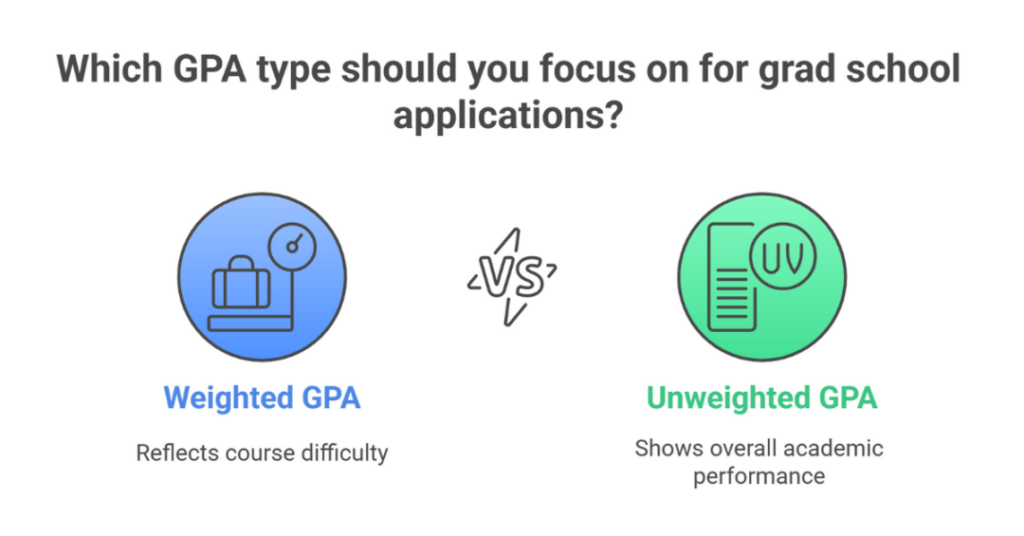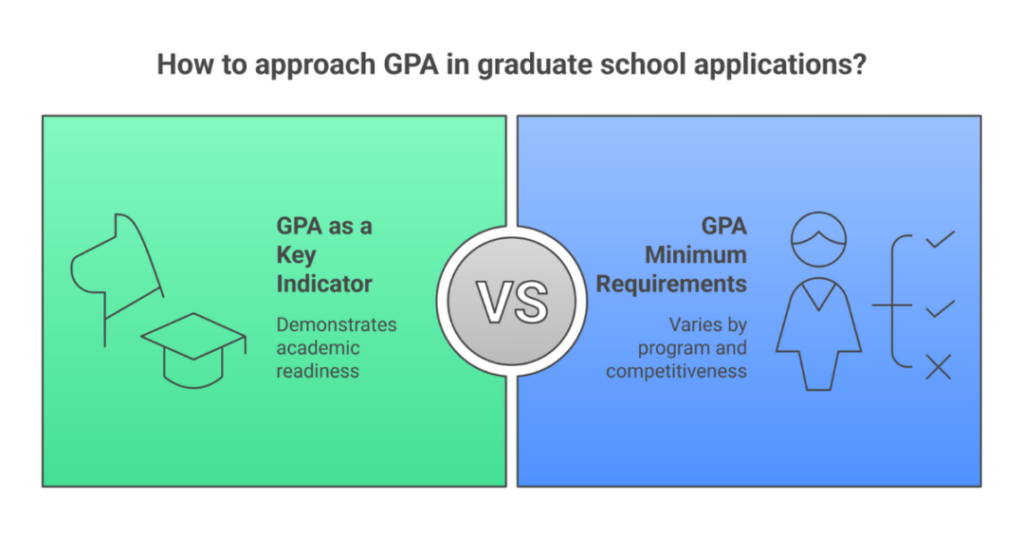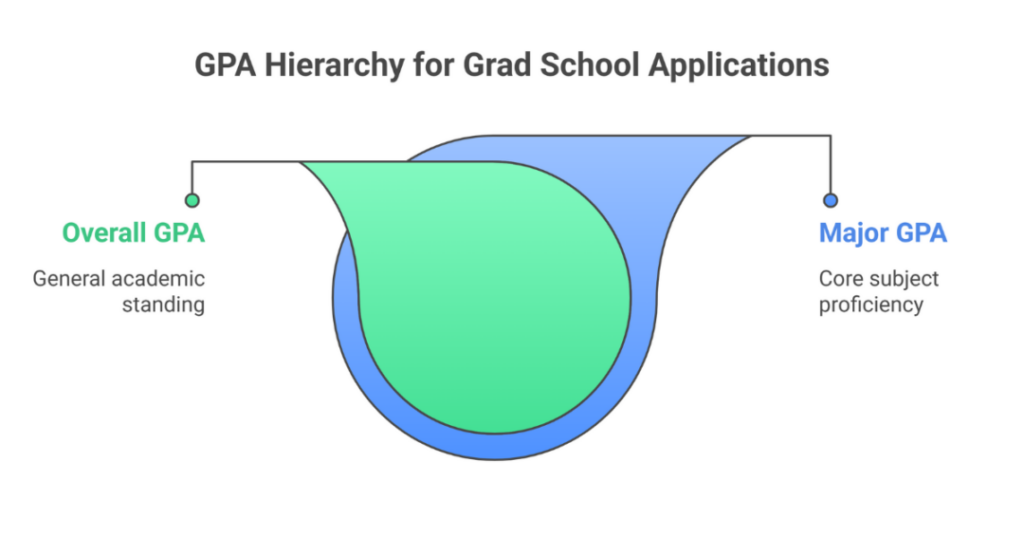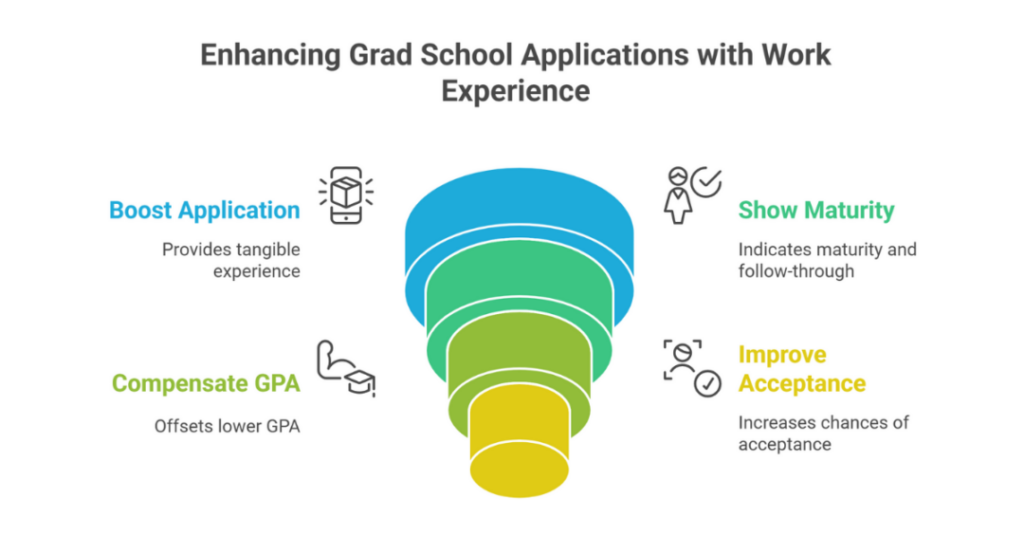23 July 2025
9 minutes read
What is the Role of GPA for Grad School Admissions (Average GPA to Get Into Top Graduate Schools for Indian Students)?

Key Takeaways
- GPA for grad school plays a critical role in admissions, often acting as the first filter for competitive programs worldwide.
- GPA for grad school typically needs to be 3.0 or higher, though top-tier universities may expect 3.5+ for most programs.
- GPA for grad school is evaluated alongside your resume, statement of purpose, and test scores to assess overall academic readiness.
“How do you create a unique grad school application?” is a question that students considering applying to graduate school are probably asking. As you prepare for graduate school, it is also important to consider the importance of a GPA, and the difference between weighted and unweighted GPAs, and the value of an overall application.
This blog will highlight how professional experience and the importance of GPA per program of study impacts admissions. If you understand what admissions committees take into consideration, then you will know how to best showcase your strengths and respond to any concerns, improving your overall success to get into your program of choice.
How Much Does GPA Matter for Grad School Applicants?
In graduate school admissions, the Grade Point Average (GPA) (or G.P.A.) can often be a leading indicator of student success and will often be weighted heavily.

There is some nuance to the GPA and having an understanding of this nuance could prove to be beneficial in applying to a graduate program of your choice.
Key Indicator
The GPA is an important admission indicator in graduate schools because it indicates a candidate’s academic performance and consistency. A GPA is a measure of readiness for graduate and professional studies, which is extremely important.
Minimum Requirements
Many graduate schools have a minimum GPA requirement, usually between 3.0 to 3.5. The minimum GPA requirement is dependent on the field of study and program. More competitive schools and programs would expect higher GPA scores.
Holistic Evaluation
GPA is one part of the evaluation system, so admissions committees will take GPA into consideration with other things like: GRE scores, work experience, and letters of recommendation. A higher GPA certainly contributes to a strong application. However, if your GPA is below a competitive standard, your professional experience or a strong statement of purpose may off-set the poor GPA.
Field-Specific Considerations
Fields vary widely (i.e. law vs. business) in terms of GPA expectations and norms, so knowing this variation can help you narrow your applications by targeting similar GPA expectations and norms.
GPA is only one piece of individual academic puzzle for student you! Ultimately, GPA is part of the overall admission system that considers an applicant’s entire profile – transcripts, standardized test scores, and a lot of other acknowledgments.
What is a Good GPA for Grad School Application?
Every university and program is different as to what constitutes a good GPA for grad school; take time to research what specific university programs expect. When applying to grad school, graduate students need to know GPA expectations and other admission requirements if GPA is a consideration.
STEM Programs
When entering a graduate program in STEM fields, a general rule of thumb for a good GPA for grad school starts around 3.5. Because many of these grad schools are highly competitive, students should maintain a high GPA in graduate programs, to show that they excel at both quantitative and analytical reasoning and thinking skills needed to be successful in a STEM discipline.
Humanities and Social Sciences
A good GPA for grad school in the humanities and social sciences typically (3.3 to 3.7) is less rigid than the prior sections but still demands a good record. Generally, graduate admissions committees are seeking well-rounded candidates with the ability to identify research interests and contributions they want to make to the field.

Business and Law Schools
For professional programs like business and law, a good GPA for grad school is generally higher, and in many cases (3.5 or above). Many competitive programs (i.e., prestige institutions) have stricter GPA requirements as well, however, it is often considered with your professional experience as well as standardized test scores – if applicable.
Arts and Creative Fields
In arts and creative disciplines, the rigorous attention to GPA can be more flexible. While good GPA is still important, the portfolio, audition, or other creative work carry weight in the admission decision.
Average GPA (Grade Point Average) for Top Grad Schools
Below is a table detailing the average GPA for some of the top graduate schools in the USA, UK, Canada, and Australia:
| University | Country | Top Programs | Minimum GPA Requirement |
|---|---|---|---|
| Massachusetts Institute of Technology (MIT) | USA | Engineering, Computer Science | 3.8+ |
| Stanford University | USA | Business, Engineering, Law | 3.7+ |
| Harvard University | USA | Law, Public Policy, Business | 3.8+ |
| University of California, Berkeley | USA | Computer Science, Engineering | 3.6+ |
| Columbia University | USA | Journalism, Business, Law | 3.7+ |
| University of Cambridge | UK | Natural Sciences, Engineering | 3.7+ (UK 2:1) |
| University of Oxford | UK | Humanities, Law, Sciences | 3.7+ (UK 2:1) |
| Imperial College London | UK | Engineering, Natural Sciences | 3.6+ (UK 2:1) |
| London School of Economics (LSE) | UK | Economics, Political Science | 3.5+ (UK 2:1) |
| University of Edinburgh | UK | Informatics, Humanities | 3.5+ (UK 2:1) |
| McGill University | Canada | Medicine, Law, Business | 3.2+ |
| University of British Columbia (UBC) | Canada | Environmental Sciences, Business | 3.5+ |
| University of Toronto | Canada | Engineering, Life Sciences | 3.6+ |
| McMaster University | Canada | Health Sciences, Engineering | 3.3+ |
| University of Alberta | Canada | Energy Systems, Computer Science | 3.0+ |
| University of Sydney | Australia | Health Sciences, Law | 3.0+ |
| Australian National University (ANU) | Australia | Public Policy, Engineering | 3.0+ |
| University of Melbourne | Australia | Law, Engineering, Medicine | 3.0+ |
| University of Queensland | Australia | Environmental Sciences, Business | 3.0+ |
| Monash University | Australia | Pharmacy, IT, Engineering | 3.0+ |
What are the Common Requirements besides GPAs Demanded by Grad School Admission Officers?
When applying to graduate programs, meeting GPA requirements is important, but admission committees take into consideration other important aspects too. Here are the customary requirements for grad school admissions beyond GPA.
Standardized Test Scores
Many grad programs require GRE or GMAT score report as those exams are commonly taken in grad school and measure verbal, quantitative, and analytical writing scores.

Personal Statement
Typically students submit a personal statement or statement of purpose to provide academic and career goals as well as information about the specific program being pursued.
Letters of Recommendation
These vary but typically expectation is that recommendation letters are required from a professor or professional who can describe the applicant’s qualifications, skills and potential for success in undergrad and graduate degree.
Relevant Experience
Working or research in the field of study will enhance an application, with evidence of gained practical knowledge and commitment.
Do Graduate Schools Look for GPA Required? How to Get into Grad School with a Low GPA?
When applying to grad school, your GPA is one of the major factors in the admissions process. Good GPA for grad programs varies, but generally is between 3.0-3.5. However, some graduate schools may have an even higher GPA standard. Your GPA is an important factor in your grad school application, but just part of it.
Ways to Overcome a Low GPA
If you have a GPA that is lower than the expected usual undergraduate GPA average, do not lose heart. Graduate admissions committees may consider all aspects of your application and take a holistic approach to your application.

For example, strong GRE (Graduate Record Examination) scores, relevant work experience, or major achievements may help you overcome a low GPA. When this happens, some schools may place more importance to your personal statement and letters of recommendation.
Explaining Your GPA
In graduate school applications, it is beneficial to explain any low grades. If it was due to your personal situation or if it was a particularly challenging load of courses, this is good context for the review committee to have when reviewing your background.
If the review committee can see you have made some progress or sufficient grades in comparable courses, the schools may be more lenient in their interpretation and consideration of your GPA.
Enhancing Your Application
One way to counter your sub-par GPA is potentially to take more coursework to attempt and raise your overall GPA, or to show excellent performance in important areas graduate schools are looking for (i.e., internships or research experience).
While many schools might have minimum GPA’s, they also vary by school (and sometimes even programs). Some graduate programs might have a conditional Admissions status designed specifically to give you opportunities to prove yourself during your studies.
As much as G.P.A. is taken into account for admissions into your school of choice, it is not only the only factor. Schools often evaluate an applicant on their whole profile.
Even with lower than average GPA scores, you have a good chance of being accepted into the school of your dreams based on how you present your strengths and how persuasively you deal with your perceived weaknesses. A good application can go along way towards your goal of furthering your academic studies or research academics, even with a lower GPA.
How Does Work Experience Affect the Need for Grad School application?
Work experience can boost a grad school application by providing a practical skill set and career knowledge. It shows that the applicant has tangible experience. This is particularly significant in the case of professional programs (e.g. MBA or law).
Admissions committees tend to regard work experience as an indication of maturity, follow-through, and the ability to translate the theoretical knowledge of their programs into the realities of the workplace. It may also serve as a compensating experience for a lower GPA and give admissions committees a better perspective on the strengths of an applicant.
Ultimately, relevant work experience can form a distinctive part of an applicant’s experience and contribute to an improved opportunity for acceptance into programs with enhanced selectivity.
Role of GPA: Weighted Vs Unweighted GPA for Grad School
It is important to know the difference between weighted and unweighted GPAs while applying to grad school. Understanding weighted and unweighted GPAs will allow you to accurately assess your academic performance and the competitiveness of your application.
Additionally, different graduate programs can consider a weighted or unweighted GPA; thus, it is important to know the difference between the two so you can clearly present your record and meet the expectations of the specific program in which you are applying.
| Aspect | Weighted GPA | Unweighted GPA |
|---|---|---|
| Definition | Takes into account course difficulty; adds additional weight to advanced courses (honours, AP, or International Baccalaureate (IB)). | Based only on the grades received and no additional weight for course difficulty. |
| Scale | Usually is on a higher weighting than 4.0 scale and can go as high as 5.0 or higher depending on the school. | Usually on 4.0 scale, where A = 4.0, B = 3.0, etc. |
| Reflects | Academic performance considering the rigor of your courses. | Aspect of their academic performance without considering the difficulty of their courses. |
| Impact on Grad School Applications | May provide a better understanding of a student’s strength with rigorous coursework. | GPA provides a standardized metric that is more easily compared across applicants and institutions. |
| Consideration by Admissions | Some grad schools may consider weighted gpa to see how rigorous a students coursework was, but not all grad schools look at weighted GPA. | GPA is a metric that most grad schools use as a common measure of a student’s academic success. |
| Comparison Across Institutions | Weights can vary greatly by schools in terms of how they weight and report advanced courses. | GPA represents a more standardized method of comparing students from different educational institutions or systems. |
Major GPA vs Overall GPA for Grad School
Recognizing the distinctions between your major GPA and your overall GPA can be useful when applying to graduate programs because it shows your strength.
If your major GPA is higher than your overall GPA, this indicates your strengths within the subject matter of the program you are applying to, and you’re already a more attractive candidate for a program with a more specialized approach.
Conversely, if your overall GPA is stronger than your major GPA, this shows your broad academic ability across different areas and broad consistency. Knowing your major GPA and overall GPA can help you plan your application better, particularly in the way you would like to present your strengths, either in relation to subject matter or overall academic performance.
| Aspect | Major GPA | Overall GPA |
|---|---|---|
| Definition | Determined by grades obtained in courses required for the student’s major. | The GPA is calculated on all courses attempted throughout the entire academic program. |
| Focus | Represents academic performance in the student’s field of study. | It indicates the overall academic ability of the student across all courses. |
| Calculation | Includes only courses in the major. | It consists of all courses regardless of their relevance to the program. |
| Use | Frequently used to indicate a demonstration of competence and expertise in an area. | It represents a whole picture of the student’s general academic ability. |
Conclusion
In traversing the complexities of graduate school admissions, you will need to be aware of type of GPA, components of an application and how to capitalize on work experience and other strengths. By tactically emphasizing your strengths and ameliorating weaknesses you create a stronger application and improve your chances of getting into your desired program of study.
Embark on your admission journey with confidence as Ambitio’s Admit Finder guides you through the maze of potential paths. This tool helps you identify the right programs and institutions, ensuring your journey is targeted, strategic, and aligned with your ultimate goals.
FAQs
What is a good GPA for grad school admission?
A good GPA for grad school typically starts at 3.0, but elite programs may expect higher. GPA for grad school varies by university and program competitiveness. A strong GPA for grad school helps strengthen your overall profile. Most importantly, GPA for grad school should reflect consistent academic performance.
Is a 2.8 GPA for grad school acceptable?
A 2.8 GPA for grad school is considered low, but not always disqualifying. Some programs may accept a 2.8 GPA for grad school if other materials are strong. Improving your test scores can offset a low GPA for grad school. Still, aim to understand what GPA for grad school your target requires.
How is GPA for grad school calculated by universities?
GPA for grad school is usually calculated using your final two years or overall undergraduate performance. Some universities recalculate GPA for grad school using only major-related courses. It’s crucial to know how your GPA for grad school translates to their scale. Each institution may treat GPA for grad school differently.
Can work experience compensate for a low GPA for grad school?
Yes, solid work experience can help counterbalance a weak GPA for grad school. If your GPA for grad school is below average, highlight industry exposure. Letters of recommendation can further support a low GPA for grad school. However, GPA for grad school still remains a core metric.
Do all programs have the same GPA for grad school requirements?
No, GPA for grad school requirements vary by field, with STEM and business often expecting higher scores. Liberal arts programs may have more flexibility with GPA for grad school. Always research specific programs for their GPA for grad school threshold. Don’t assume one GPA for grad school fits all.
Can I apply without knowing my GPA for grad school?
You should calculate your GPA for grad school before applying, as most applications require it. Many universities offer GPA for grad school conversion tools for international students. Without a verified GPA for grad school, your application may remain incomplete. Clarifying your GPA for grad school ensures smoother processing.
How does GPA for grad school affect scholarship chances?
A strong GPA for grad school improves eligibility for merit-based scholarships. GPA for grad school often acts as a qualifying factor for funding. With a higher GPA for grad school, your chances of receiving financial aid increase. Always check if GPA for grad school meets scholarship cutoffs.

You can study at top universities worldwide!
Get expert tips and tricks to get into top universities with a free expert session.
Book Your Free 30-Minute Session Now! Book a call now




























